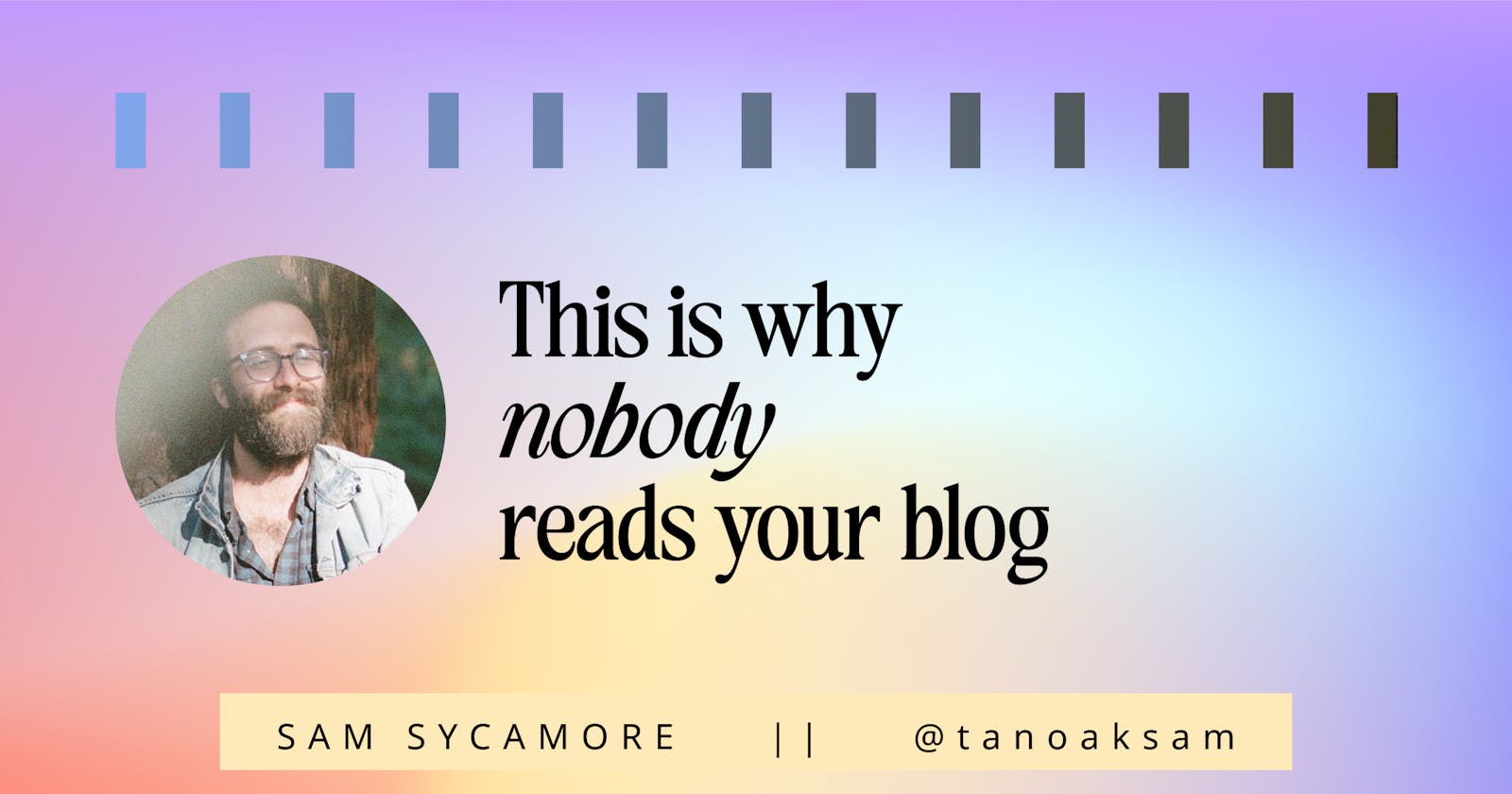This is Why Nobody Reads Your Blog
Your headlines aren't convincing anybody to click. Let's fix that.
Coming up with a title for your article is the most important piece of the blogging puzzle.
David Ogilvy, considered "the Father of Advertising," had this to say about headlines:
On average, five times as many people read the headline as read the body copy. When you have written your headline, you have spent eighty cents out of your dollar. If you haven't done some selling in your headline, you have wasted 80% of your money.
As part of my job with Hashnode, I spend a lot of time combing through blog posts on the platform.
I can say with 100% certainty that if you don't get the title right, nobody is going to read your post.
Don't get me wrong: a strong headline doesn't guarantee results.
But almost every time I see a post that hasn't gotten any traffic, it turns out the author has made some crucial mistakes with the title.
And it's a shame, too, because many of those writers are publishing solid content, but you'd never know what's hidden beyond the lackluster headline.
Trust me: I've been there. The advice I have to share could save you from years of disappointment and heartache.
Let's review some of the most common mistakes I observe, and explore how you can correct them.
❌ Your title doesn't grab our attention
The primary purpose of a headline is to get attention.
Obvious, right?
Well, it's often easier said than done.
In all honesty, writing headlines is one of the most difficult tasks that writers face—especially when they don't have systems in place to streamline their process.
Here's the secret about coming up with a killer title:
It's not about creativity. It's about persuasion.
In other words:
Forget the flowery language and clever wordplay, and start brushing up on basic human psychology.
Persuasive writing isn't poetry.
This is the art of copywriting, and there are tried-and-true formulas you can lean on to increase your chances of success.
You're reading this article because the title persuaded you to click.
What did I do to grab your attention?
Keep reading, and I'll explain.
❌ Your title doesn't make any promises
One of the most effective ways to gain your reader's attention is to answer the question:
"What's in it for me?"
How can you reward the reader for the time they will invest in your article?
Your headline should make a promise to the reader that you fulfill in the content.
Why do we refer to some headlines as "clickbait"?
Because the title offers us a huge reward for clicking, but the article that follows does not deliver on the promise.
If your article Top 7 Coding Tricks That Will Absolutely Blow Your Mind only contains 4 "tricks" and does not, in fact, "blow my mind," I'm just going to be frustrated that you lied to me—even if the content was otherwise decent.
It's ok to make a big promise in your headline. Just don't offer what you can't follow through on.
Consider the title of my article again: This is Why Nobody Reads Your Blog.
It's not obvious at first glance, but when I came up with this title I was very intentional about making you a promise: if you read this article, you will learn what you've been missing about how to get people to check out your work.
What if I had named it Writing Headlines is Hard?
That would still give you an idea of what it's about, but it doesn't offer you any reward for reading.
❌ Your title isn't provocative
Why does Facebook's algorithm constantly show you the most inflammatory political posts from people in your network?
Because they figured out a long time ago that the best way to keep us all engaged on the platform was to bombard us with emotional provocation.
Make no mistake about it: the power to provoke an emotional response in your reader is your most dangerous weapon as a writer.
It's alarmingly easy to persuade people to act against their own best interests by playing to their emotions.
I bring all this up to say, wield this weapon wisely.
If you tug on your audience's heartstrings, it has to pay off in the end, or again, you're just going to make them angry that you manipulated them.
And if you lean too hard on being provocative, you'll eventually spiral out in an endless solo game of one-upsmanship, forced to outdo yourself with each successive outburst until you've offended, insulted, or alienated everyone you've ever known.
It happens.
Once again, consider my title here: This is Why Nobody Reads Your Blog.
I was intentional about choosing a title that's a little more provocative than what I'd usually pick, for the sake of demonstration.
If you've ever written a blog and struggled to get people to read it, then this title kind of stings a little, right? It doesn't feel good to be reminded of failure or disappointment.
But it's in the interest of making you the aforementioned promise: it's implied that I'm poking you about it because I want to help you solve the problem.
I'm not just being a jerk for no good reason! 😂
I want to help you avoid disappointment next time.
What if I had named it How to Write a Title?
That still conveys that I want to help you solve a problem.
But it's also the least sexy thing I could imagine! 🤣 You're not going to arouse anything but boredom with a headline like that.
❌ Your title doesn't identify your audience
A key question that many writers fail to answer in their headline is: who is this for?
If I'm unsure about whether the content is relevant to me, I'm probably not going to take the time to find out.
Don't make your audience guess! Be as specific as possible.
One more time, consider the title before us today: This is Why Nobody Reads Your Blog.
It's pretty clear who this is for, right? Bloggers who are struggling to get their work noticed.
What if I had named it something like Top 5 Writing Tips & Tricks?
Aside from the fact that it's not very exciting or provocative, it's not at all clear who my intended audience is. Writers? That doesn't narrow things down enough.
Remember: if you try to appeal to everybody, you'll end up appealing to nobody. You're much better off making deeper connections with (potentially) fewer people.
✅ Summary
The next time you're trying to come up with a good title for a blog post, keep this in mind:
get attention
make a promise
be provocative
identify your audience
To frame it another way, consider the following questions about a potential title:
- does it stand out?
(Note: don't rely on CHEAP TACTICS LIKE ALL CAPS or 🔥💥 way 🙅♂️ too 👎 many 🚀😅 emoji—it looks like spam, which is the opposite of persuasive)
is it clear what the reader will gain from reading?
does it resonate on an emotional level?
is it obvious who it's intended for?
✅ Conclusion
As with everything, the most surefire way to improve at writing headlines is to practice!
Don't just write one title for your next article.
Write ten variations.
Experiment with being extra-exciting, extra-provocative; make gigantic promises, and target the most specific audience you can imagine.
Then pick the one that you think is most memorable.
The more you do this, the better you'll get at it.
Also: pay close attention to the headlines that persuade you to click.
Now that you know the formula, I bet you'll see these same patterns repeated over, and over, and over again.
If you learn to pick out what works best for your target audience—and then practice, practice, practice!—I'm confident that your readership will grow.
If you enjoyed this piece and you want to keep up with my work, you can sign up for my email newsletter through this link. I promise to make every email something you will be excited to open!

